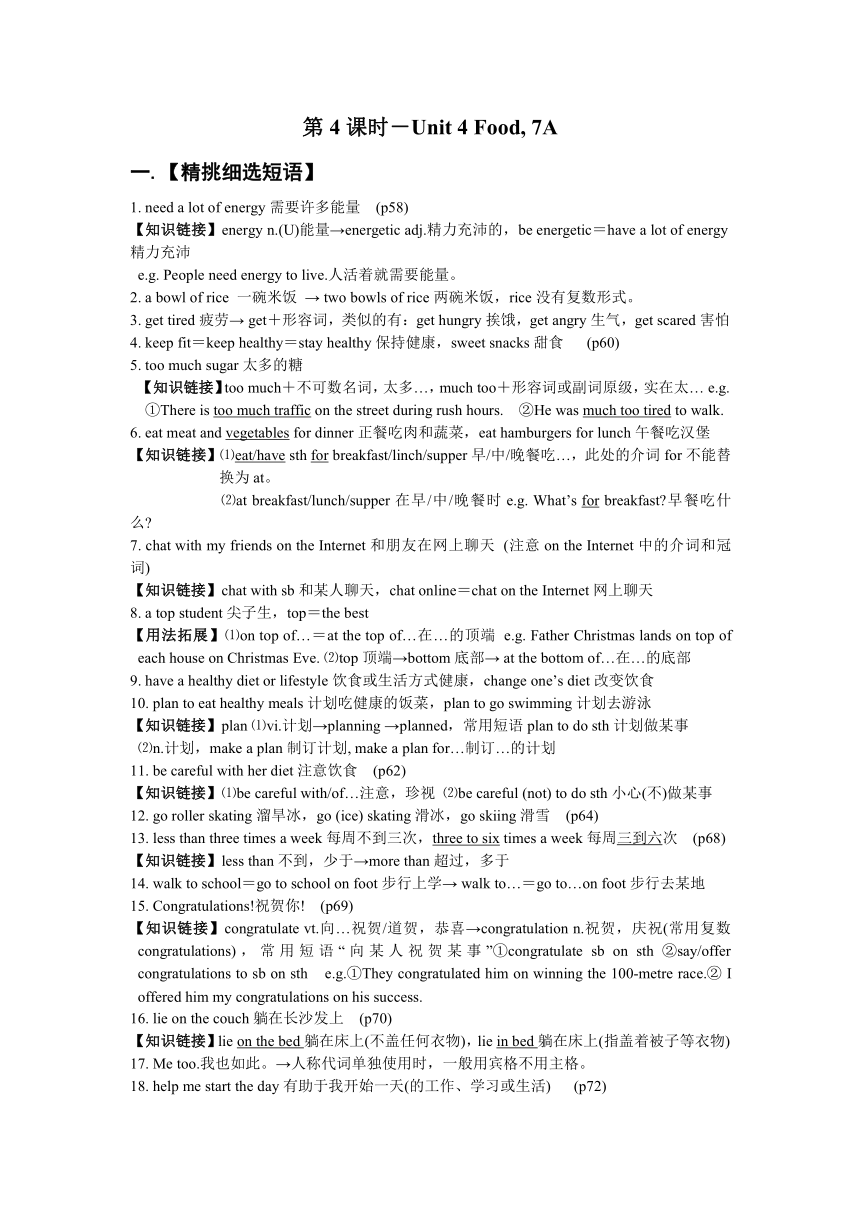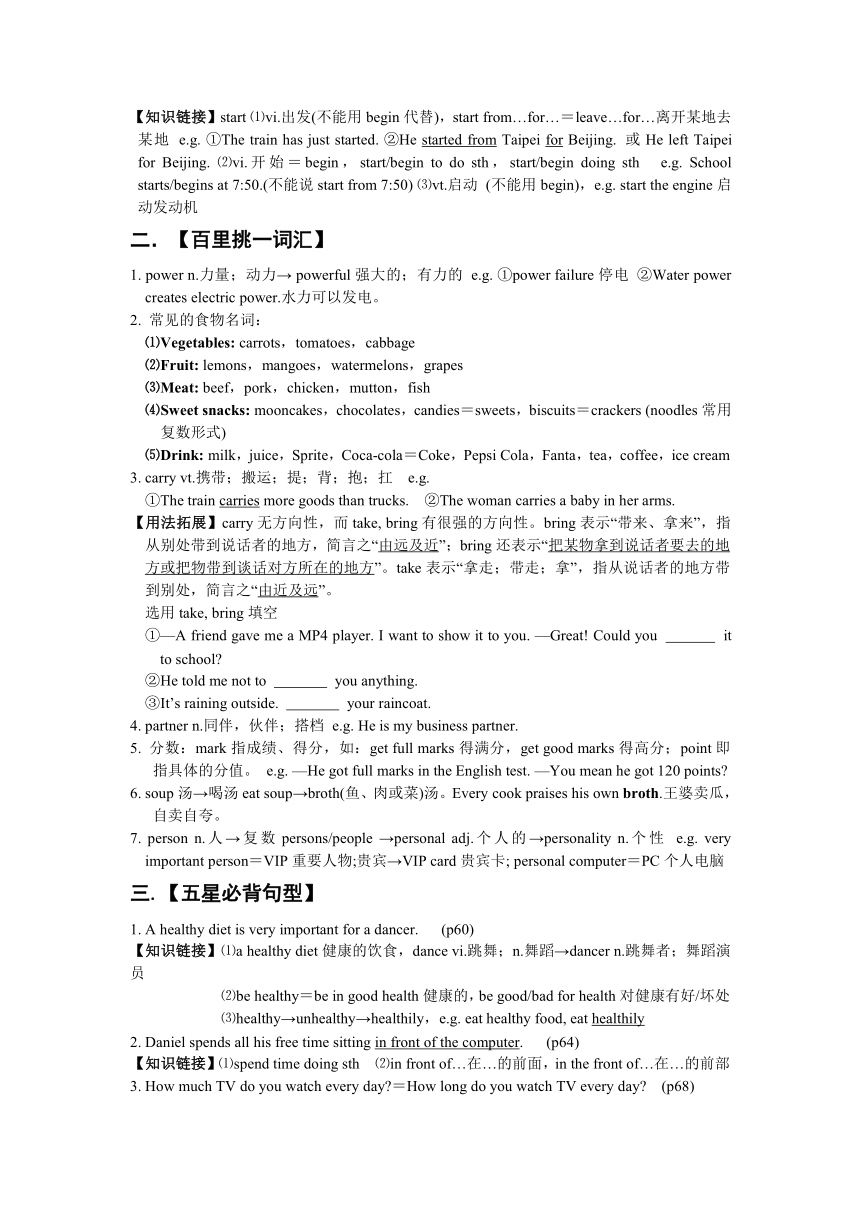2012年江苏省中考英语一轮复习7A Unit4讲解
文档属性
| 名称 | 2012年江苏省中考英语一轮复习7A Unit4讲解 |

|
|
| 格式 | zip | ||
| 文件大小 | 18.9KB | ||
| 资源类型 | 教案 | ||
| 版本资源 | 通用版 | ||
| 科目 | 英语 | ||
| 更新时间 | 2012-01-15 00:00:00 | ||
图片预览


文档简介
第4课时-Unit 4 Food, 7A
一.【精挑细选短语】
1. need a lot of energy需要许多能量 (p58)
【知识链接】energy n.(U)能量→energetic adj.精力充沛的,be energetic=have a lot of energy精力充沛
e.g. People need energy to live.人活着就需要能量。
2. a bowl of rice 一碗米饭 → two bowls of rice两碗米饭,rice没有复数形式。
3. get tired疲劳→ get+形容词,类似的有:get hungry挨饿,get angry生气,get scared害怕
4. keep fit=keep healthy=stay healthy保持健康,sweet snacks甜食 (p60)
5. too much sugar太多的糖
【知识链接】too much+不可数名词,太多…,much too+形容词或副词原级,实在太… e.g.
①There is too much traffic on the street during rush hours. ②He was much too tired to walk.
6. eat meat and vegetables for dinner正餐吃肉和蔬菜,eat hamburgers for lunch午餐吃汉堡
【知识链接】⑴eat/have sth for breakfast/linch/supper早/中/晚餐吃…,此处的介词for不能替换为at。
⑵at breakfast/lunch/supper在早/中/晚餐时e.g. What’s for breakfast 早餐吃什么
7. chat with my friends on the Internet和朋友在网上聊天 (注意on the Internet中的介词和冠词)
【知识链接】chat with sb和某人聊天,chat online=chat on the Internet网上聊天
8. a top student尖子生,top=the best
【用法拓展】⑴on top of…=at the top of…在…的顶端 e.g. Father Christmas lands on top of each house on Christmas Eve. ⑵top顶端→bottom底部→ at the bottom of…在…的底部
9. have a healthy diet or lifestyle饮食或生活方式健康,change one’s diet改变饮食
10. plan to eat healthy meals计划吃健康的饭菜,plan to go swimming计划去游泳
【知识链接】plan ⑴vi.计划→planning →planned,常用短语plan to do sth计划做某事
⑵n.计划,make a plan制订计划, make a plan for…制订…的计划
11. be careful with her diet注意饮食 (p62)
【知识链接】⑴be careful with/of…注意,珍视 ⑵be careful (not) to do sth小心(不)做某事
12. go roller skating溜旱冰,go (ice) skating滑冰,go skiing滑雪 (p64)
13. less than three times a week每周不到三次,three to six times a week每周三到六次 (p68)
【知识链接】less than不到,少于→more than超过,多于
14. walk to school=go to school on foot步行上学→ walk to…=go to…on foot步行去某地
15. Congratulations!祝贺你! (p69)
【知识链接】congratulate vt.向…祝贺/道贺,恭喜→congratulation n.祝贺,庆祝(常用复数congratulations),常用短语“向某人祝贺某事”①congratulate sb on sth ②say/offer congratulations to sb on sth e.g.①They congratulated him on winning the 100-metre race.② I offered him my congratulations on his success.
16. lie on the couch躺在长沙发上 (p70)
【知识链接】lie on the bed躺在床上(不盖任何衣物),lie in bed躺在床上(指盖着被子等衣物)
17. Me too.我也如此。→人称代词单独使用时,一般用宾格不用主格。
18. help me start the day有助于我开始一天(的工作、学习或生活) (p72)
【知识链接】start ⑴vi.出发(不能用begin代替),start from…for…=leave…for…离开某地去某地 e.g. ①The train has just started. ②He started from Taipei for Beijing. 或He left Taipei for Beijing. ⑵vi.开始=begin,start/begin to do sth,start/begin doing sth e.g. School starts/begins at 7:50.(不能说start from 7:50) ⑶vt.启动 (不能用begin),e.g. start the engine启动发动机
二.【百里挑一词汇】
1. power n.力量;动力→ powerful强大的;有力的 e.g. ①power failure停电 ②Water power creates electric power.水力可以发电。
2. 常见的食物名词:
⑴Vegetables: carrots,tomatoes,cabbage
⑵Fruit: lemons,mangoes,watermelons,grapes
⑶Meat: beef,pork,chicken,mutton,fish
⑷Sweet snacks: mooncakes,chocolates,candies=sweets,biscuits=crackers (noodles常用复数形式)
⑸Drink: milk,juice,Sprite,Coca-cola=Coke,Pepsi Cola,Fanta,tea,coffee,ice cream
3. carry vt.携带;搬运;提;背;抱;扛 e.g.
①The train carries more goods than trucks. ②The woman carries a baby in her arms.
【用法拓展】carry无方向性,而take, bring有很强的方向性。bring表示“带来、拿来”,指从别处带到说话者的地方,简言之“由远及近”;bring还表示“把某物拿到说话者要去的地方或把物带到谈话对方所在的地方”。take表示“拿走;带走;拿”,指从说话者的地方带到别处,简言之“由近及远”。
选用take, bring填空
①—A friend gave me a MP4 player. I want to show it to you. —Great! Could you it to school
②He told me not to you anything.
③It’s raining outside. your raincoat.
4. partner n.同伴,伙伴;搭档 e.g. He is my business partner.
5. 分数:mark指成绩、得分,如:get full marks得满分,get good marks得高分;point即指具体的分值。 e.g. —He got full marks in the English test. —You mean he got 120 points
6. soup汤→喝汤eat soup→broth(鱼、肉或菜)汤。Every cook praises his own broth.王婆卖瓜,自卖自夸。
7. person n.人→复数persons/people →personal adj.个人的→personality n.个性 e.g. very important person=VIP重要人物;贵宾→VIP card贵宾卡; personal computer=PC个人电脑
三.【五星必背句型】
1. A healthy diet is very important for a dancer. (p60)
【知识链接】⑴a healthy diet健康的饮食,dance vi.跳舞;n.舞蹈→dancer n.跳舞者;舞蹈演员
⑵be healthy=be in good health健康的,be good/bad for health对健康有好/坏处
⑶healthy→unhealthy→healthily,e.g. eat healthy food, eat healthily
2. Daniel spends all his free time sitting in front of the computer. (p64)
【知识链接】⑴spend time doing sth ⑵in front of…在…的前面,in the front of…在…的前部
3. How much TV do you watch every day =How long do you watch TV every day (p68)
4. You are not fit at all. (p69)→肯定句变为含有not…at all的三个步骤:肯定句→否定句→句尾加at all。
【知识链接】⑴Not at all.不用谢;没关系。⑵not…at all一点也不…,根本不…。
5. You need to exercise more, watch less TV and eat healthy food.
【知识链接】⑴need to do sth有必要做某事 ⑵exercise more=do more exercise多锻炼
⑶watch less TV少看电视 ⑷eat healthy food→eat healithily吃得健康
6. I don’t eat them any more. (p70)
【知识链接】not …any more=no more…再也不…,The child didn’t cry any more when he saw his mother.
7. Good luck with your new diet and lifestyle.
【知识链接】⑴Good luck (to you).祝你好运。Good luck to sb.祝某人好运。⑵Good luck with sth.祝某事顺利。e.g. ①Good luck to Peter. ②Good luck with your entrance exams.
8. There are no calories in water, so you can drink it without getting fat. (p72)
【知识链接】⑴get fat变胖;发胖→get+形容词,是系表结构。⑵without prep.没有,不,无,with+名词/代词/动名词,①He went out without a hat. ②We can’t live without air.=We can’t live if there is no air. ③He left angrily without saying a word. ④I will fail without your help.=I will fail if you don’t help me.
四.【中考无敌语法】频度副词、可数名词与不可数名词、There be句型
㈠频度副词与疑问词How often, How long
⒈never从不,seldom很少,sometimes有时,often经常,usually通常,always总是
⒉疑问词How often:对两种词提问,即:①频度副词 ②每天/周/月/年…××次
⒊疑问词How long:对一段时间提问,常见的有:①for+一段时间 ②since+过去时间/过去时间状语从句。e.g. —How long have you studied at your school —Since over two years ago.
㈡可数名词与不可数名词
⒈名词可分为可数名词和不可数名词。可数名词有单数和复数两种形式;可数名词单数之前用a/an修饰。如:an hour, a university, There is an “s” and a “u” in the word “use”. 可数名词复数分为规则和不规则。
以元音开头的辅音字母共8个:n, m, f, x, l, h, s, r【巧记】你(n)的妹妹(m)发(f)现(x)老(l)虎(h)杀(s)人(r)。
⒉可数名词复数的规则变化:
⑴大多数名词的复数形式是在单数名词后加-s。e.g. chair→chairs, ball→balls
⑵以-s, -x, -ch, -sh结尾的名词后加-es,注意stomach的复数形式为stomachs。e.g.
bus →buses, fox →foxes, bench →benches, brush →brushes
⑶以“辅音字母+y”结尾的名词要变-y为-ies;以“元音字母+y”结尾的名词直接加-s。 e.g.
family→families, country→countries, company→companies, factory→factories, baby→babies, story →stories, boy→boys, toy→toys, day→days
⑷有些以-f或-fe结尾的名词要去掉-f或-fe再加-ves。e.g.
knife→knives, life→lives, leaf→leaves, half→halves, thief→thieves, wolf→wolves
⑸有些以-f或-fe结尾的名词直接加-s。e.g. roof→roofs, belief→beliefs, gulf→gulfs
⑹以“元音字母+o”结尾的名词加-s。e.g. radio→radios, zoo→zoos, studio→studios, bamboo→bamboos
⑺以“辅音字母+o”结尾的名词加-es。e.g.
potato→potatoes, tomato→tomatoes, mango→mangoes, hero→heroes, Negro →Negroes (黑人)
⑻有些外来词虽然以“辅音字母+o”结尾,但只加-s。e.g. radio →radios, piano →pianos
⒊可数名词复数的不规则变化:
⑴改变内部元音字母:man→men, woman→women, policeman/woman→policemen/policemen, spaceman →spacemen, foot→feet, tooth→teeth, goose→geese, mouse→mice
【注意】German→Germans, Walkman →Walkmans
⑵词尾加-(r)en:child→children, ox→oxen(公牛)
⒋合成词的复数形式:⑴某些由“名词+名词”即名词修饰名词的复合词,后一个名词后变为复数。e.g.
a boy/girl student →boy/girl students, an apple tree →apple trees ⑵由“man/woman+名词”的复合名词,两部分都要变。e.g. a man/woman writer →men/women writers
⒌名词复数形式的特殊变化:
⑴单复数同形的名词:①某些动物名词:fish→fish, sheep→sheep, deer→deep ②表示某国人的名词:Chinese, Japanese ③其他:means方式,works工厂,crossroads十字路口
⑵只有复数形式的名词:表示由两部分构成的东西的词:trousers, shorts, glasses, scissors
⒍不可数名词前可以用数量词表示数量,即“数词+名词+of+不可数名词”。
a piece of bread→pieces of bread, a glass of water/juice/milk→glasses of water/juice/milk
㈢There be句型
“There be+某物/某人+某地/某时.”表示“某地或某时有某物或某人”。“某物/某人”是该结构的主语,因此动词be的形式要随着它后面的名词而变化。总体说来有以下三种形式:
⑴There is+名词单数或不可数名词+某地/某时. e.g. There is some water in the bottle.
⑵There is+名词单数和复数+某地/某时. e.g. There is a tree and many flowers in the garden.
⑶There are+名词复数+某地/某时. e.g. There are 60 minutes in an hour.
总结:综上所述,There are+名词复数,其余都使用There is…。
一.【精挑细选短语】
1. need a lot of energy需要许多能量 (p58)
【知识链接】energy n.(U)能量→energetic adj.精力充沛的,be energetic=have a lot of energy精力充沛
e.g. People need energy to live.人活着就需要能量。
2. a bowl of rice 一碗米饭 → two bowls of rice两碗米饭,rice没有复数形式。
3. get tired疲劳→ get+形容词,类似的有:get hungry挨饿,get angry生气,get scared害怕
4. keep fit=keep healthy=stay healthy保持健康,sweet snacks甜食 (p60)
5. too much sugar太多的糖
【知识链接】too much+不可数名词,太多…,much too+形容词或副词原级,实在太… e.g.
①There is too much traffic on the street during rush hours. ②He was much too tired to walk.
6. eat meat and vegetables for dinner正餐吃肉和蔬菜,eat hamburgers for lunch午餐吃汉堡
【知识链接】⑴eat/have sth for breakfast/linch/supper早/中/晚餐吃…,此处的介词for不能替换为at。
⑵at breakfast/lunch/supper在早/中/晚餐时e.g. What’s for breakfast 早餐吃什么
7. chat with my friends on the Internet和朋友在网上聊天 (注意on the Internet中的介词和冠词)
【知识链接】chat with sb和某人聊天,chat online=chat on the Internet网上聊天
8. a top student尖子生,top=the best
【用法拓展】⑴on top of…=at the top of…在…的顶端 e.g. Father Christmas lands on top of each house on Christmas Eve. ⑵top顶端→bottom底部→ at the bottom of…在…的底部
9. have a healthy diet or lifestyle饮食或生活方式健康,change one’s diet改变饮食
10. plan to eat healthy meals计划吃健康的饭菜,plan to go swimming计划去游泳
【知识链接】plan ⑴vi.计划→planning →planned,常用短语plan to do sth计划做某事
⑵n.计划,make a plan制订计划, make a plan for…制订…的计划
11. be careful with her diet注意饮食 (p62)
【知识链接】⑴be careful with/of…注意,珍视 ⑵be careful (not) to do sth小心(不)做某事
12. go roller skating溜旱冰,go (ice) skating滑冰,go skiing滑雪 (p64)
13. less than three times a week每周不到三次,three to six times a week每周三到六次 (p68)
【知识链接】less than不到,少于→more than超过,多于
14. walk to school=go to school on foot步行上学→ walk to…=go to…on foot步行去某地
15. Congratulations!祝贺你! (p69)
【知识链接】congratulate vt.向…祝贺/道贺,恭喜→congratulation n.祝贺,庆祝(常用复数congratulations),常用短语“向某人祝贺某事”①congratulate sb on sth ②say/offer congratulations to sb on sth e.g.①They congratulated him on winning the 100-metre race.② I offered him my congratulations on his success.
16. lie on the couch躺在长沙发上 (p70)
【知识链接】lie on the bed躺在床上(不盖任何衣物),lie in bed躺在床上(指盖着被子等衣物)
17. Me too.我也如此。→人称代词单独使用时,一般用宾格不用主格。
18. help me start the day有助于我开始一天(的工作、学习或生活) (p72)
【知识链接】start ⑴vi.出发(不能用begin代替),start from…for…=leave…for…离开某地去某地 e.g. ①The train has just started. ②He started from Taipei for Beijing. 或He left Taipei for Beijing. ⑵vi.开始=begin,start/begin to do sth,start/begin doing sth e.g. School starts/begins at 7:50.(不能说start from 7:50) ⑶vt.启动 (不能用begin),e.g. start the engine启动发动机
二.【百里挑一词汇】
1. power n.力量;动力→ powerful强大的;有力的 e.g. ①power failure停电 ②Water power creates electric power.水力可以发电。
2. 常见的食物名词:
⑴Vegetables: carrots,tomatoes,cabbage
⑵Fruit: lemons,mangoes,watermelons,grapes
⑶Meat: beef,pork,chicken,mutton,fish
⑷Sweet snacks: mooncakes,chocolates,candies=sweets,biscuits=crackers (noodles常用复数形式)
⑸Drink: milk,juice,Sprite,Coca-cola=Coke,Pepsi Cola,Fanta,tea,coffee,ice cream
3. carry vt.携带;搬运;提;背;抱;扛 e.g.
①The train carries more goods than trucks. ②The woman carries a baby in her arms.
【用法拓展】carry无方向性,而take, bring有很强的方向性。bring表示“带来、拿来”,指从别处带到说话者的地方,简言之“由远及近”;bring还表示“把某物拿到说话者要去的地方或把物带到谈话对方所在的地方”。take表示“拿走;带走;拿”,指从说话者的地方带到别处,简言之“由近及远”。
选用take, bring填空
①—A friend gave me a MP4 player. I want to show it to you. —Great! Could you it to school
②He told me not to you anything.
③It’s raining outside. your raincoat.
4. partner n.同伴,伙伴;搭档 e.g. He is my business partner.
5. 分数:mark指成绩、得分,如:get full marks得满分,get good marks得高分;point即指具体的分值。 e.g. —He got full marks in the English test. —You mean he got 120 points
6. soup汤→喝汤eat soup→broth(鱼、肉或菜)汤。Every cook praises his own broth.王婆卖瓜,自卖自夸。
7. person n.人→复数persons/people →personal adj.个人的→personality n.个性 e.g. very important person=VIP重要人物;贵宾→VIP card贵宾卡; personal computer=PC个人电脑
三.【五星必背句型】
1. A healthy diet is very important for a dancer. (p60)
【知识链接】⑴a healthy diet健康的饮食,dance vi.跳舞;n.舞蹈→dancer n.跳舞者;舞蹈演员
⑵be healthy=be in good health健康的,be good/bad for health对健康有好/坏处
⑶healthy→unhealthy→healthily,e.g. eat healthy food, eat healthily
2. Daniel spends all his free time sitting in front of the computer. (p64)
【知识链接】⑴spend time doing sth ⑵in front of…在…的前面,in the front of…在…的前部
3. How much TV do you watch every day =How long do you watch TV every day (p68)
4. You are not fit at all. (p69)→肯定句变为含有not…at all的三个步骤:肯定句→否定句→句尾加at all。
【知识链接】⑴Not at all.不用谢;没关系。⑵not…at all一点也不…,根本不…。
5. You need to exercise more, watch less TV and eat healthy food.
【知识链接】⑴need to do sth有必要做某事 ⑵exercise more=do more exercise多锻炼
⑶watch less TV少看电视 ⑷eat healthy food→eat healithily吃得健康
6. I don’t eat them any more. (p70)
【知识链接】not …any more=no more…再也不…,The child didn’t cry any more when he saw his mother.
7. Good luck with your new diet and lifestyle.
【知识链接】⑴Good luck (to you).祝你好运。Good luck to sb.祝某人好运。⑵Good luck with sth.祝某事顺利。e.g. ①Good luck to Peter. ②Good luck with your entrance exams.
8. There are no calories in water, so you can drink it without getting fat. (p72)
【知识链接】⑴get fat变胖;发胖→get+形容词,是系表结构。⑵without prep.没有,不,无,with+名词/代词/动名词,①He went out without a hat. ②We can’t live without air.=We can’t live if there is no air. ③He left angrily without saying a word. ④I will fail without your help.=I will fail if you don’t help me.
四.【中考无敌语法】频度副词、可数名词与不可数名词、There be句型
㈠频度副词与疑问词How often, How long
⒈never从不,seldom很少,sometimes有时,often经常,usually通常,always总是
⒉疑问词How often:对两种词提问,即:①频度副词 ②每天/周/月/年…××次
⒊疑问词How long:对一段时间提问,常见的有:①for+一段时间 ②since+过去时间/过去时间状语从句。e.g. —How long have you studied at your school —Since over two years ago.
㈡可数名词与不可数名词
⒈名词可分为可数名词和不可数名词。可数名词有单数和复数两种形式;可数名词单数之前用a/an修饰。如:an hour, a university, There is an “s” and a “u” in the word “use”. 可数名词复数分为规则和不规则。
以元音开头的辅音字母共8个:n, m, f, x, l, h, s, r【巧记】你(n)的妹妹(m)发(f)现(x)老(l)虎(h)杀(s)人(r)。
⒉可数名词复数的规则变化:
⑴大多数名词的复数形式是在单数名词后加-s。e.g. chair→chairs, ball→balls
⑵以-s, -x, -ch, -sh结尾的名词后加-es,注意stomach的复数形式为stomachs。e.g.
bus →buses, fox →foxes, bench →benches, brush →brushes
⑶以“辅音字母+y”结尾的名词要变-y为-ies;以“元音字母+y”结尾的名词直接加-s。 e.g.
family→families, country→countries, company→companies, factory→factories, baby→babies, story →stories, boy→boys, toy→toys, day→days
⑷有些以-f或-fe结尾的名词要去掉-f或-fe再加-ves。e.g.
knife→knives, life→lives, leaf→leaves, half→halves, thief→thieves, wolf→wolves
⑸有些以-f或-fe结尾的名词直接加-s。e.g. roof→roofs, belief→beliefs, gulf→gulfs
⑹以“元音字母+o”结尾的名词加-s。e.g. radio→radios, zoo→zoos, studio→studios, bamboo→bamboos
⑺以“辅音字母+o”结尾的名词加-es。e.g.
potato→potatoes, tomato→tomatoes, mango→mangoes, hero→heroes, Negro →Negroes (黑人)
⑻有些外来词虽然以“辅音字母+o”结尾,但只加-s。e.g. radio →radios, piano →pianos
⒊可数名词复数的不规则变化:
⑴改变内部元音字母:man→men, woman→women, policeman/woman→policemen/policemen, spaceman →spacemen, foot→feet, tooth→teeth, goose→geese, mouse→mice
【注意】German→Germans, Walkman →Walkmans
⑵词尾加-(r)en:child→children, ox→oxen(公牛)
⒋合成词的复数形式:⑴某些由“名词+名词”即名词修饰名词的复合词,后一个名词后变为复数。e.g.
a boy/girl student →boy/girl students, an apple tree →apple trees ⑵由“man/woman+名词”的复合名词,两部分都要变。e.g. a man/woman writer →men/women writers
⒌名词复数形式的特殊变化:
⑴单复数同形的名词:①某些动物名词:fish→fish, sheep→sheep, deer→deep ②表示某国人的名词:Chinese, Japanese ③其他:means方式,works工厂,crossroads十字路口
⑵只有复数形式的名词:表示由两部分构成的东西的词:trousers, shorts, glasses, scissors
⒍不可数名词前可以用数量词表示数量,即“数词+名词+of+不可数名词”。
a piece of bread→pieces of bread, a glass of water/juice/milk→glasses of water/juice/milk
㈢There be句型
“There be+某物/某人+某地/某时.”表示“某地或某时有某物或某人”。“某物/某人”是该结构的主语,因此动词be的形式要随着它后面的名词而变化。总体说来有以下三种形式:
⑴There is+名词单数或不可数名词+某地/某时. e.g. There is some water in the bottle.
⑵There is+名词单数和复数+某地/某时. e.g. There is a tree and many flowers in the garden.
⑶There are+名词复数+某地/某时. e.g. There are 60 minutes in an hour.
总结:综上所述,There are+名词复数,其余都使用There is…。
